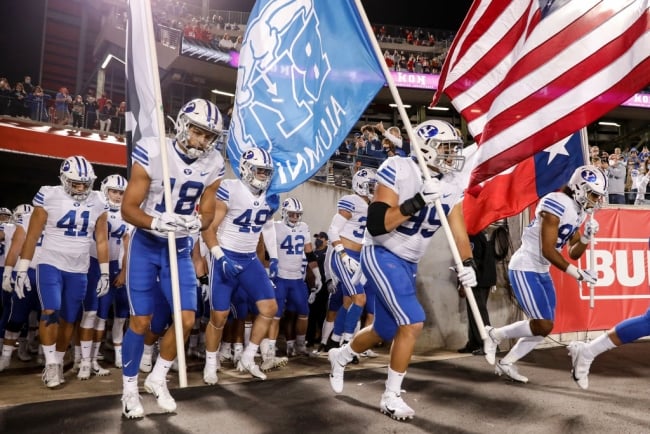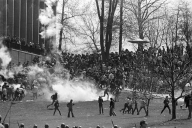You have /5 articles left.
Sign up for a free account or log in.

Brigham Young football has signed an all-team NIL deal with a protein bar company.
Tim Warner/Contributor/Getty Images Sport
When name, image and likeness reforms swept through the NCAA in June, it ushered in a new era for college sports and student athletes alike, one that some observers have likened to the Wild West, with little in the way of guidance as schools and players navigate new terrain.
But if policies allowing athletes to profit from their name, image and likeness are akin to the Wild West, the NCAA is the sheriff tasked with overseeing law and order in this uncharted territory. And that’s a tough job—NIL laws are a patchwork across states. Some states have no NIL laws, forcing colleges located within their borders to rely on the loose guidelines the NCAA provided at the last minute as a court opinion opened the door for NIL last summer.
The lack of clear-cut NCAA policies has created a host of confusion around many aspects of NIL, including whole-team deals, experts say.
For example, Brigham Young University recently signed an agreement with a protein bar company, in which scholarship football players can receive $1,000 each for representing Built Bar, while nonscholarship teammates receive a stipend that will “cover the cost of their tuition for at least one year,” according to ESPN. The University of Miami offers another example of an early whole-team deal, with scholarship football players earning money for promoting a chain of gyms on social media. And while BYU and Miami may be early leaders on whole-team NIL deals, they’re in territory that hasn’t been clearly defined by the NCAA.
“There’s not really any guidance from the NCAA,” said Erin E. Butcher, a higher education attorney at Bricker & Eckler in Ohio. “Where does a group deal cross the line from a permissible NIL deal to being some sort of improper recruiting inducement or pay for play?”
Now it appears the NCAA is taking a look at programs that have potentially crossed the murky lines of NIL. NCAA president Mark Emmert, without going into specifics, announced in December that the organization was investigating “a number” of schools for possible NIL violations.
Asked for details on potential or ongoing investigations, the NCAA declined to comment. Early media coverage, however, has indicated that the NCAA has expressed interest in Miami and BYU, particularly the whole-team deals signed by both football programs.
Whole-Team NIL Deals
According to Sportico, the NCAA may be probing those deals, announced last summer, for possible pay-for-play violations.
As of publication, Miami said it had not been contacted by the NCAA regarding an NIL deal signed with a chain of gyms.
BYU, however, said it has been contacted by the NCAA with questions about the NIL deal between its football team and the protein bar company.
“We have communicated with the NCAA concerning the Built Bar NIL arrangement,” Jon McBride, associate athletic director for communications and media strategy at BYU, said in an email. “They have informed us they do not have any additional questions at this time. We will continue to monitor and abide by the NCAA interim NIL policy.”
Asked about the BYU and Miami NIL deals, Kenneth L. Shropshire, professor and CEO of the Global Sport Institute at Arizona State University, flagged two possible concerns for the NCAA.
At BYU, he suggested the concern may be related to scholarship limits for the football team. While NCAA Division I football teams are limited, by rule, to 85 scholarships, having an outside organization pay for the cost of attendance for walk-ons may blur the lines of what is appropriate.
At Miami, Dan Lambert, the gym owner and architect of the whole-team NIL deal for the football program, also founded a corporation dedicated to identifying NIL opportunities for Miami student athletes. Shropshire suggested that the breadth of the team deal raises the question of “how much influence one individual could have on a team or a program” through NIL agreements.
Thilo Kunkel, a professor and director of the Sport Industry Research Center at Temple University, said that one way schools can run afoul of the NCAA on such deals is if athletes are collecting NIL money without providing a service, which is essentially a pay-to-play issue.
“The payment is directly linked to a certain deliverable,” Kunkel said. “Oftentimes, these deliverables are social media posts. However, some of these athletes that are at these universities don’t even have a public Twitter or Instagram account. So that means that they’re getting paid for a deliverable that they essentially can’t fulfill as it currently stands.”
Beyond pay for play, legal experts said that schools have to be careful to avoid signing whole-team NIL deals that may be a potential recruiting inducement and thus an NCAA rule violation.
“I think the NCAA may be interested in whether this is going to give a school an advantage over other schools,” Butcher said. “Are people going to want to come to a school because they’re getting paid to participate when they could go to a different school and not have that deal?”
But again, legal experts noted these boundaries are undefined in the new territory of NIL.
“The line between an NIL opportunity and a pay for play and a recruiting inducement is paper-thin,” said Patrick Stubblefield, a sports attorney at Freeman Lovell in Utah and a former college compliance official. “And it’s not entirely clear where that line should be drawn.”
NIL Risk vs. Reward
Kunkel noted that even as questions circle whole-team deals, they can benefit the companies that ink the agreements as well as the athletes cashing in.
“These organizations get a lot of positive media attention beyond the actual deal,” he said. “They get immediately associated with the whole university without paying for the university brand.”
But universities need to look hard at whole-team deals in the infancy of NIL, he said: “I think the probe is already sending a signal to universities that have been thinking about group deals to make sure you have your legal ducks in a row before you actually sign something.”
The possibility of NCAA investigations, said Stubblefield, should send a message to colleges to tread carefully into whole-team NIL deals. He suggested colleges hire outside counsel to help navigate these gray areas and to ask questions of the NCAA prior to signing such agreements.
Ultimately, he said he’ll be surprised to see the NCAA take action unless there are clear violations, noting that the organization is exposed to its own degree of risk in policing NIL.
“Early indications were that the NCAA was going to take a hands-off approach to NIL, which makes sense to me. Because they’re putting themselves at a fair amount of risk,” Stubblefield said. “Say they strike down certain deals—if the NCAA steps in and takes a heavy-handed approach, they put themselves in a fair amount of legal risk given the Alston opinion.”
The Alston opinion, a Supreme Court case that paved the way for NIL over the summer, leaves open the possibility that student athletes could push the NCAA for direct compensation.
Despite the uncertainty surrounding whole-team NIL deals—now under the specter of NCAA compliance investigations—colleges have continued to sign such agreements in recent weeks. The University of Alabama women’s gymnastics team, for example, signed a teamwide deal in late December that requires each athlete to participate in interviews and post to social media on behalf of the sponsor, CrowdPush, an online fundraising platform.
Regardless of the outcome of the probe, some experts think the NCAA is responsible for creating the possible compliance issues. Despite having years to plan for the potential of NIL for student athletes, Kunkel said, the organization did little to ready itself. The lack of a well-designed NIL framework makes compliance harder for schools, he said. Now the NCAA finds itself policing an area it never prepared colleges, students or itself to navigate.
“With the lack of a framework,” Kunkel said, “people are going to start bending the rules.”








